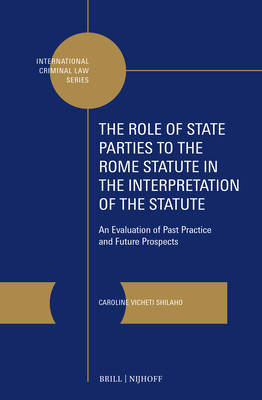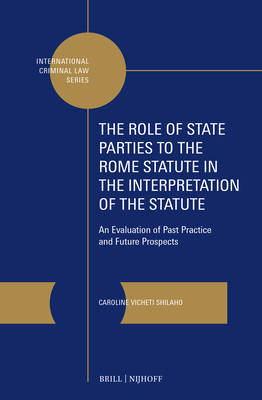
- Afhalen na 1 uur in een winkel met voorraad
- Gratis thuislevering in België vanaf € 30
- Ruim aanbod met 7 miljoen producten
- Afhalen na 1 uur in een winkel met voorraad
- Gratis thuislevering in België vanaf € 30
- Ruim aanbod met 7 miljoen producten
Zoeken
The Role of State Parties to the Rome Statute in the Interpretation of the Statute
An Evaluation of Past Practice and Future Prospects
Caroline Vicheti Shilaho
€ 198,45
+ 396 punten
Omschrijving
This book offers a groundbreaking and thought-provoking examination of the intricate interplay between the role of State Parties to the Rome Statute in the interpretation of the Statute, particularly when the International Criminal Court (ICC) holds the explicit authority to do so. Utilizing the interpretation rules under Article 31(3) of the Vienna Convention on the Law of Treaties, it demonstrates how State Parties, through their subsequent agreements and practice continue to influence treaty interpretation under the Rome Statute.
The book highlights specific examples where State Parties have enacted amendments to the rules and passed resolutions during related ongoing ICC cases, prompting questions about their influence on the ICC's interpretive decisions. The nuanced relationship between State Parties and the ICC in interpreting the Statute is explored, revealing the inherent tension that emerges from the overlapping interpretive roles. It provides insightful recommendations for navigating and alleviating such tensions.
The book highlights specific examples where State Parties have enacted amendments to the rules and passed resolutions during related ongoing ICC cases, prompting questions about their influence on the ICC's interpretive decisions. The nuanced relationship between State Parties and the ICC in interpreting the Statute is explored, revealing the inherent tension that emerges from the overlapping interpretive roles. It provides insightful recommendations for navigating and alleviating such tensions.
Specificaties
Betrokkenen
- Auteur(s):
- Uitgeverij:
Inhoud
- Aantal bladzijden:
- 254
- Taal:
- Engels
- Reeks:
- Reeksnummer:
- nr. 20
Eigenschappen
- Productcode (EAN):
- 9789004725522
- Verschijningsdatum:
- 20/11/2025
- Uitvoering:
- Hardcover
- Formaat:
- Genaaid
- Afmetingen:
- 155 mm x 235 mm

Alleen bij Standaard Boekhandel
+ 396 punten op je klantenkaart van Standaard Boekhandel
Beoordelingen
We publiceren alleen reviews die voldoen aan de voorwaarden voor reviews. Bekijk onze voorwaarden voor reviews.








